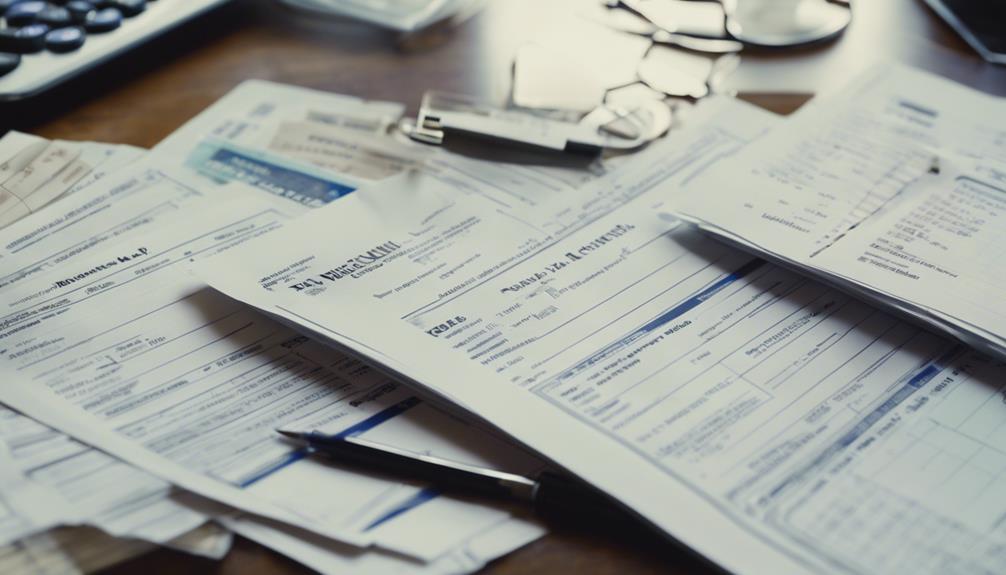Gather your driver's license, birth certificate, social security card, and financial records like pay stubs and asset documentation. Provide proof of citizenship/residency with clear copies of valid documents. Include medical history, treatments, and release forms for healthcare info. Don't forget income verification, benefits, and vehicle details. Thorough documentation ensures accurate eligibility determination for New Jersey Medicaid.
Required Identification Documents
Gather your driver's license or state-issued ID as the primary identification document for your New Jersey Medicaid application. These are crucial for verifying your identity.
In addition to your driver's license, you'll need to provide a copy of your birth certificate and social security card. Your birth certificate confirms your date of birth, while your social security card serves as proof of your social security number, both essential pieces of information for your application.
If you don't have a driver's license, a passport can also be used as a valid form of identification.
Ensuring you have these documents readily available will streamline the application process and help avoid any delays. Make sure all copies are clear and legible before submitting them.
Financial Documentation
Having your financial documentation prepared and organized is essential for a smooth New Jersey Medicaid application process. When applying for Medicaid in New Jersey, you'll need to provide income verification and asset documentation.
Income verification includes recent pay stubs, tax returns, social security benefits statements, pension statements, and any other documents showing your household's income. Make sure to gather these documents for all members of your household who contribute to the income.
Asset documentation is also crucial for your Medicaid application. This includes bank statements, investment account statements, real estate deeds, vehicle titles, and any other proof of assets you own.
Having these documents readily available will help streamline the application process and ensure accurate information is provided to the Medicaid office.
Proof of Citizenship or Residency
To proceed with your New Jersey Medicaid application, you must provide proof of your citizenship or residency status. Proof of citizenship or legal residency is a crucial requirement for Medicaid eligibility verification.
You can provide a copy of your birth certificate, passport, or certificate of naturalization to prove your citizenship status. If you're a legal resident but not a citizen, documents such as a green card, visa, or other immigration papers can serve as verification of your residency status.
It is essential to ensure that the documents you submit are current and valid. Medicaid authorities in New Jersey require clear and legible copies of these documents to process your application promptly. Make sure that the copies aren't altered or expired, as this could lead to delays in verifying your eligibility for Medicaid coverage.
Medical Records and Health Information
When submitting your New Jersey Medicaid application, ensure you include all relevant medical records and health information for prompt processing. To streamline the review process, it's crucial to provide comprehensive documentation.
Begin by gathering your medical history, including any diagnoses, treatments, and medications. Treatment logs that detail the services you've received are essential. Make sure these records are up to date and accurately reflect your current health status.
In addition to medical records, you may need to complete release forms or authorization documents. These forms allow Medicaid to obtain information directly from your healthcare providers, ensuring all necessary details are available for review.
Double-check that all forms are filled out correctly to avoid any delays in processing your application.
Additional Supporting Documents
Ensure you gather all necessary additional supporting documents to strengthen your New Jersey Medicaid application. When it comes to income verification, make sure to include recent pay stubs, W-2 forms, or tax returns. These documents are crucial to demonstrate your financial situation accurately.
Additionally, any proof of other forms of income, such as social security benefits, pension statements, or alimony, should be included to provide a comprehensive overview.
For asset documentation, gather bank statements, investment account statements, and information regarding any real estate you own. It's essential to present a clear picture of your assets to determine Medicaid eligibility accurately.
Include details about any vehicles you own and their value, as well as information on any life insurance policies.
Submitting thorough income verification and asset documentation will help expedite the Medicaid application process and ensure that you meet all the necessary requirements. By being organized and proactive in gathering these additional supporting documents, you increase your chances of a successful New Jersey Medicaid application.
Conclusion
Now that you have gathered all the necessary documents for your New Jersey Medicaid application, it's time to submit them and begin the process of accessing vital healthcare services.
As you hand over your paperwork, you can almost envision the officials carefully reviewing each page, determining your eligibility. The anticipation builds as you wait to receive the news that could change your life and give you the support you need.
